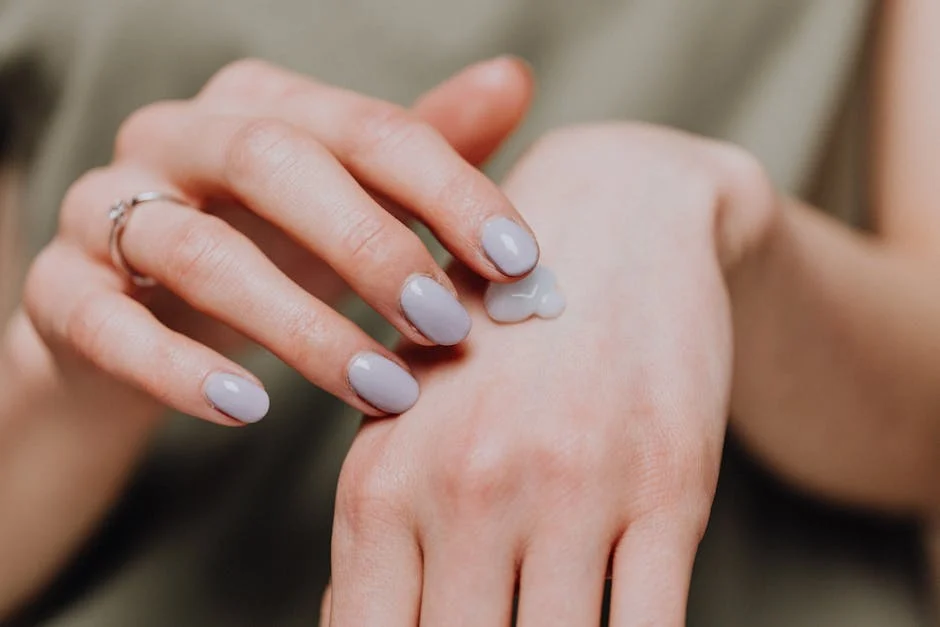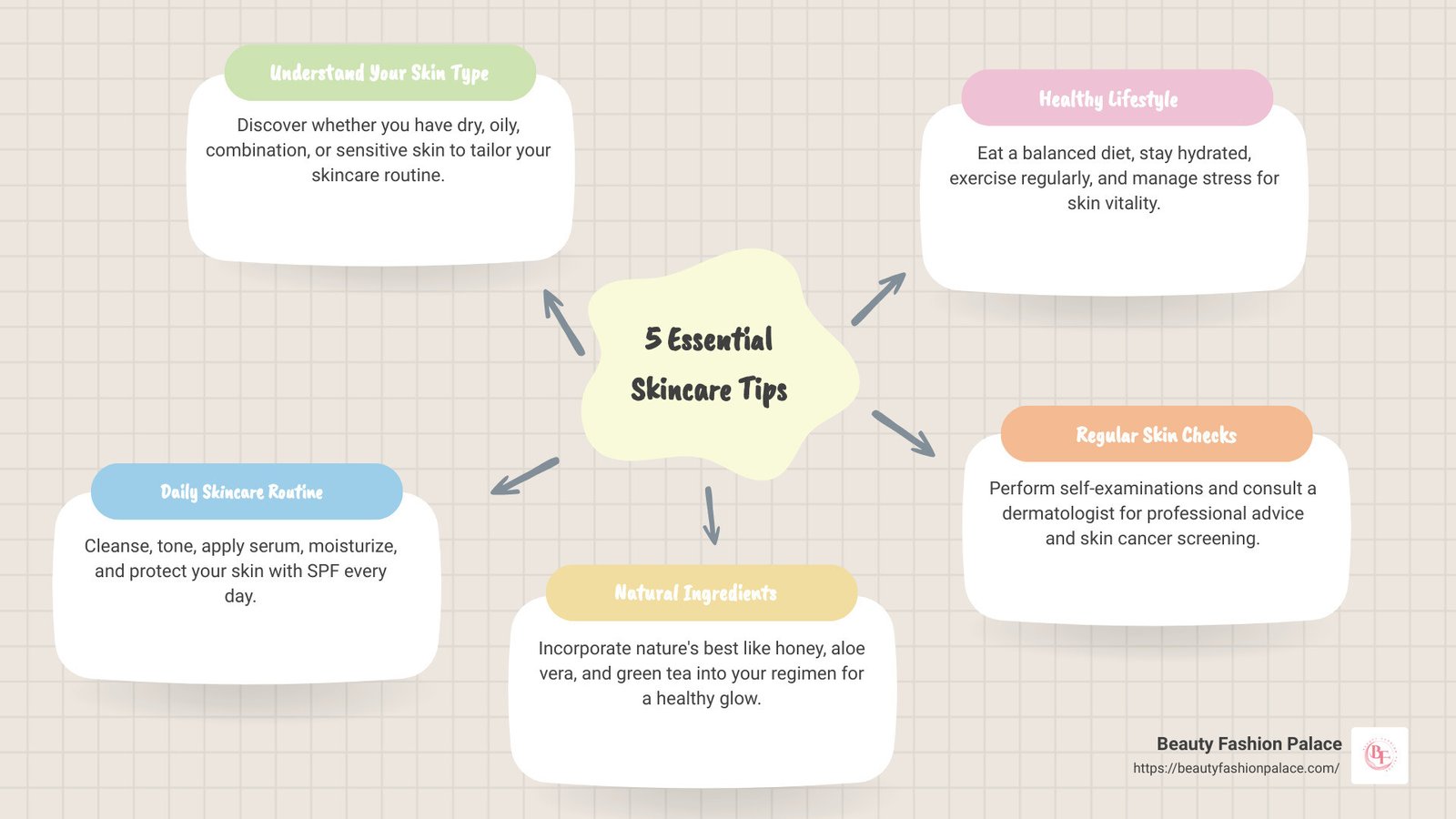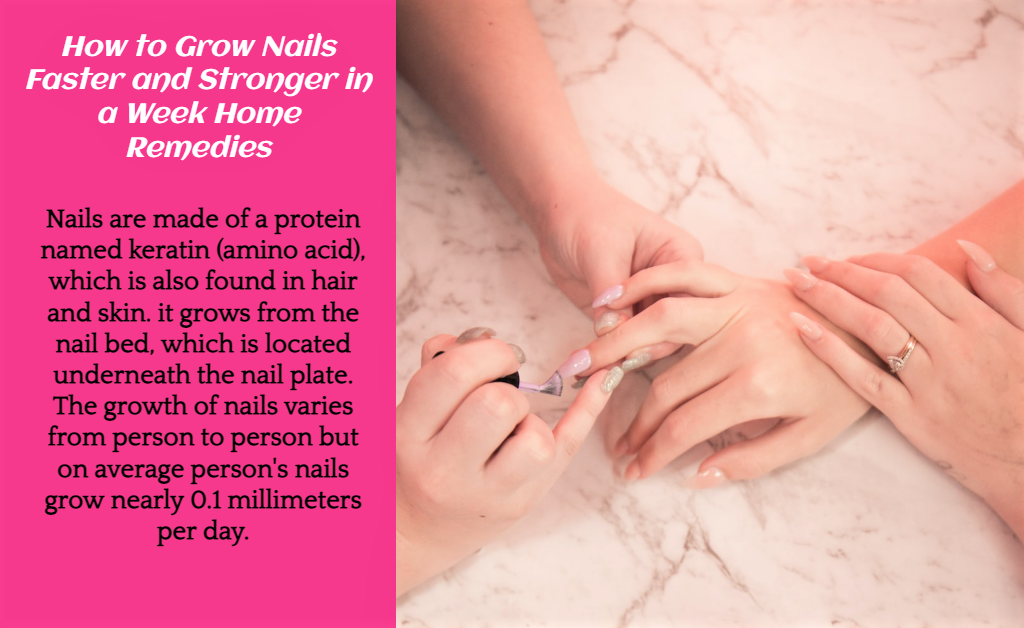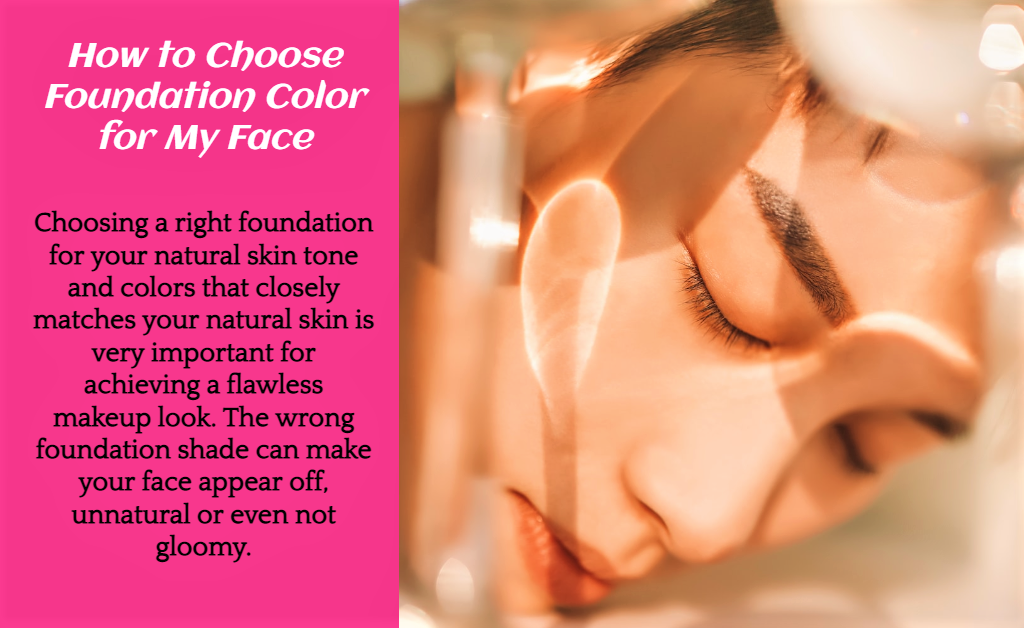Skincare is not just about looking good; it’s about staying healthy. Your skin, which is your body’s largest organ, acts as a protective protector against environmental problems, regulates your body temperature, and even aids in the identification of possible infections. The importance of skincare can result in serious long-term effects of early aging, skin cancer, and various skin diseases.

Five Essential Skincare Tips
- Understand Your Skin Type
- Establish a Daily Skincare Routine
- Use Natural Ingredients
- Maintain a Healthy Lifestyle
- Have Regular Skin Checks

Understanding Your Skin Type
The first step on your journey to healthier skin is understanding your skin type. Knowing your skin type is crucial as it determines the products you should use, the daily care routine you should follow, and the lifestyle changes that can help improve your skin health.
Importance of Knowing Your Skin Type
When we speak about skin types, we are referring to the condition and feel of your skin. Without understanding your skin type, you might be using the wrong products or following a skincare routine that does more harm than good. Using products not suitable for your skin type can cause irritation, breakouts, and premature aging.
Different Skin Types and Their Characteristics
There are generally five skin types: Normal, Dry, Oily, Combination, and Sensitive. Each skin type has unique characteristics:
- Normal skin is well-balanced – not too dry, not too oily. It has few imperfections, no severe sensitivities, and barely visible pores.
- Dry skin can feel tight and rough and appear dull. It has almost invisible pores, less elasticity, and more visible lines.
- Oily skin is characterized by enlarged pores, a shiny complexion, and is prone to blackheads, pimples, or other blemishes.
- Combination skin can be dry or normal in some areas and oily in others, such as the T-zone (nose, forehead, and chin).
- Sensitive skin may sting, burn, or itch after you use some makeup or other products.
How to Determine Your Skin Type
The easiest way to determine your skin type is through the ‘bare-faced’ method, which involves cleansing your face with a mild cleanser, patting it dry, then waiting for 30 minutes.
- If your skin feels tight, you likely have dry skin.
- If there is noticeable shine on your nose and forehead, your skin is probably normal/combination.
- If there is shine on your cheeks in addition to your forehead and nose, you likely have oily skin.
- If your skin feels itchy, you might have sensitive skin.
You can also determine your skin type by observing the color of your veins on your wrist, as explained on our site. Blue or purple veins typically indicate a cool undertone, while green or olive veins often point to a warm undertone.
Understanding your skin type is the first step to creating an effective skincare routine. Your skin is unique, and so should be your skincare routine. Changing your skincare routine to suit your skin type is the best way to keep your skin healthy and beautiful.
Daily Skincare Routine
Keeping your skin healthy and beautiful goes beyond just applying makeup. It involves a regular daily routine that caters to the specific needs of your skin. Here at Beauty Fashion Palace, we believe in a full-service skincare daily routine that involves cleansing, toning, applying serum and actives, moisturizing, and protecting your skin from the sun.
Step 1: Cleansing Your Skin
The first step in your skincare routine should be cleansing your skin. This is essential for removing dirt, oil, and impurities that build up on your skin throughout the day. When you cleanse your skin, you’re starting with a fresh outer layer, preparing your skin to absorb the nutrients from the rest of your skincare routine. Remember to use a cleanser that’s suitable for your skin type to avoid causing irritation or dryness.
Step 2: Toning Your Skin
A necessary, yet often overlooked, step in a skincare routine is toning. A good toner like our Fruit Acid Toner helps to remove any left-over dirt or makeup that your cleanser may have missed. Additionally, it helps to balance the pH levels of your skin and prepare it for the following steps.
Step 3: Applying Serum and Actives
The next step is to apply serums and actives. These products are packed with potent ingredients that target specific skin concerns such as wrinkles, pigmentation, or acne. Select a serum that addresses your skin needs. For example, our Vitrine Complete Botanical Treatment is a combination of a moisturizer and serum that hydrates and nourishes the skin. Vitrine
Step 4: Moisturizing Your Skin
Hydration is key for healthy skin. A good moisturizer will lock in hydration and keep your skin feeling soft and smooth. It also helps to create a protective barrier that prevents moisture loss and shields the skin from environmental aggressors.
Step 5: Protecting Your Skin from the Sun
Last but not least, it’s crucial to protect your skin from the sun. Overexposure to the sun’s ultraviolet (UV) rays can cause premature aging, sunburn, and skin cancer. Always apply a broad-spectrum sunscreen before heading outdoors, even if it’s cloudy. UV rays can penetrate clouds and cause damage to your skin.

Conclusion
Caring for your skin should not be a daunting task. With the right knowledge and a consistent routine, you can maintain a healthy and glowing complexion. Let’s quickly recap the core concepts we covered in our guide about the ‘5 ways to take care of your skin’.
Recap of the 5 Essential Skincare Tips
- Understanding Your Skin Type: Everyone’s skin is unique. Determining whether yours is oily, dry, sensitive, or a combination is the first step towards customizing a skincare routine that suits your needs.
- Daily Skincare Routine: A basic skincare routine includes cleansing, toning, applying serum and actives, moisturizing, and sun protection. This routine helps keep your skin clean, hydrated, and protected from harmful UV rays.
- Natural Ingredients and DIY Home Remedies for Skincare: Incorporating natural ingredients into your skincare routine can provide numerous benefits. They’re often less harsh than synthetic ingredients and can be as effective.
- Lifestyle Factors Affecting Skin Health: Your diet, exercise routine, and stress levels can significantly impact your skin health. Maintaining a balanced lifestyle is key to achieving a healthy complexion.
- Regular Skin Checks and Consultation with a Dermatologist: Regular self-examinations can help you detect any changes or abnormalities on your skin. It’s essential to consult with a dermatologist if you notice anything unusual or if you need professional advice.


